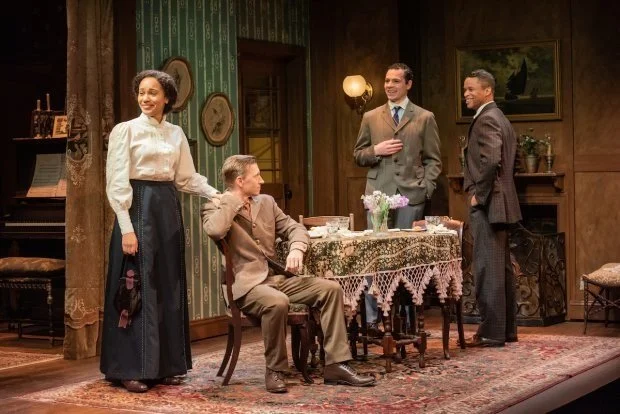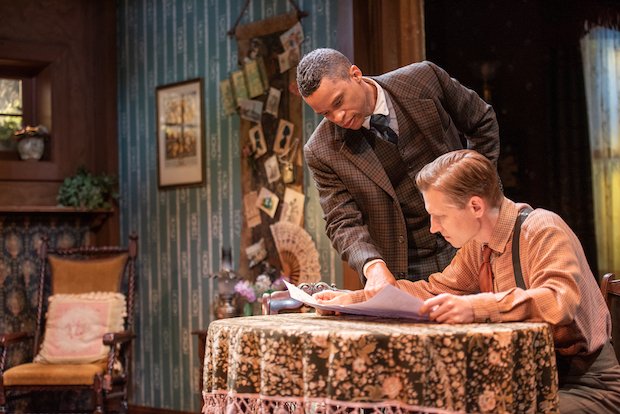Chains
Photo by Todd Cerveris
Published June 27, 2022
News of the Great Resignation has filled recent reports, chronicling Americans seeking changes in life and work following the first waves of Covid-19. The seemingly conflicting desires of security and fulfillment, which have long paralyzed middle-class workers, continue to elude workers in America’s post-Covid landscape. This is hardly a new quandary, as Elizabeth Baker’s Chains demonstrates. Her 1909 play, receiving its American premiere from the Mint Theater Company, has proven itself to be timeless – alarmingly so.
Baker’s play chronicles a turn-of-the century couple whose orderly life is thrown into disruption when one person dares to look at life beyond his next paycheck. Lily (Laakan McHardy) and Charley Wilson (Jeremy Beck) rent a comfortable, if slightly cramped, home, and take in boarders for extra income. When the aptly named Mr. Tenet (Peterson Townsend), announces his decision to abandon his steady job and seek his fortune in Australia, ripples of shock and discontent unsettle this tightly-knit circle of family and friends.
They are quickly felt in director Jenn Thompson’s efficiently powerful production. Charley wonders how his life would have unfolded if he had not married Lily when he was just 23. Lilly’s vivacious sister Maggie (Olivia Gilliatt), questions her engagement to the wealthy but dull Walter (Ned Noyes), and their boisterous next-door neighbor Mr. Leslie (Brian Owen), masks any sense of longing with his loud and humorous ridicule of Mr. Tenet’s decision. Lily’s parents (Anthony Cochrane and Amelia White) are properly shocked by their son-in-law’s desire for adventure over stability, while her younger brother Percy (Avery Whitted) refuses to heed his brother-in-law’s warnings of marrying his eager girlfriend Sybil (Claire Saunders) too quickly.
Photo by Todd Cerveris
Lily, who had cheerfully existed in a state of wedded content, is shocked when Charley admits his desire to see more of the world – even after his wages are cut at his job. She then declares that if her husband does want to leave, she will not stop him. But McHardy’s poise and depth reveal there is more to Lily than first seems. Beck gives a powerful performance as Charley, practically vibrating with longing and suppressed aner. His desperation is almost palpable, especially when he swears his love for Lily, suggesting she join him in Australia after he establishes himself. Maggie is the only person who seems to understand why he would want to leave.
In a more typical play, Maggie and Charley would fall in love and happily depart England together. But no such chemistry exists between Beck and Gilliatt; their shared connection is philosophical – in some ways, even more intimate than romance. Gilliatt is excellent as Maggie as she quickly evolves from happily brandishing her engagement ring to admitting she only agreed to the marriage to end her career as a shopgirl. Whitted gives a charming performance as the youthful Percy; one worries that his happy naivete will quickly abandon him after he walks down the aisle.
It’s easy to sympathize with Charley’s panicked entrapment; John McDermott’s set clearly depicts the trappings of middle-class life in the suburbs of London. Surrounded by heavy furniture and faded trinkets, Charlie’s only glimpse of a life outside of his own is the patch of garden he tends, where even the snails get the better of him. David Toser's costumes subtly contribute to the atmosphere; Charlie’s top hat and white collar play prominent roles.
Baker did not only focus on the plight of the working man; the stifling lives of women, as they move directly from their father’s house to their husband’s, is also dramatized. When Maggie tells her fiancé she longs for freedom, he responds with, “You’ll be free when you’re married to me!” The acceptance of their societal routines is played for laughs – when anyone announces a change in their life, the immediate response is, “You’re going to be married?” – as well as sadness – when Charley voices his discontent with the dull life fo a clerk, he is asked in shock, “You don’t mean to suggest we like our work?” But it’s Maggie who presents it so starkly when she dully remarks, “Is there anything to look forward to?”
Baker’s ending cleverly upturns societal norms once again; what would be considered a standard happy ending instead inspires aches of regret, especially within the context of recent headlines. One wishes Chains wasn’t so powerful 113 years after its premiere. These heavy chains seem impossible from which to break free.


